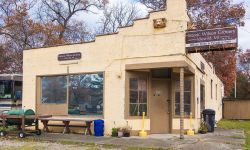White House worried about rapid spike in Detroit coronavirus cases

Related: Trump grants some disaster aid to Michigan; state also gets N95 masks
DETROIT — Michigan’s coronavirus outbreak is spreading so fast in Detroit that it's worrying federal officials, and the Rev. Horace Sheffield III fears he may know one of the reasons.
“Quite frankly, I think too many were not taking enough precautions,’’ and “still gathering” in public and ignoring pleas to stay home as recently as last week, Sheffield, 65, told Bridge on Thursday.
The pastor and civil-rights activist tested positive for COVID-19 on Tuesday and is self-quarantining at home. One of at least 851 city residents to test positive for the coronavirus — about a third of the total in all of Michigan — Sheffield is the latest in a series of prominent Detroiters to get the illness.
Thursday alone, Sheffield, state Rep. Tyrone Carter and the family of Hilton Napoleon, police chief of the Detroit enclave of Highland Park, went public with positive tests. Earlier this week, community leader Marlowe Stoudamire and Wayne County Sheriff Commander Donafay Collins died of the virus, while nearly 400 Detroit police officers and 21 firefighters are quarantined because of it.
- The latest: Michigan coronavirus map, locations, updated COVID-19 news
- What Michigan’s coronavirus stay-at-home order means for residents
- Coronavirus spreading faster in Detroit than nearly anywhere in United States
On Thursday, Dr. Deborah Birx, the coordinator of the White House coronavirus response, said officials are worried about the rapid spread of the virus in Detroit’s Wayne County and Cook County, Ill., home to Chicago.
She called both “hot spots,” according to The Hill, an online news site.
"The hot spots are in urban areas or communities that serve that urban area, and I think that’s something very important to remember as we move forward," she said.
Detroit is the epicenter of Michigan’s coronavirus outbreak in part because of a prevalence of testing, Mayor Mike Duggan said Thursday, adding “there is no doubt that thousands and thousands in the state have the virus.
“We’re just not testing them,” Duggan said at a press conference.
In all, Detroit accounted for 25 percent of Michigan’s coronavirus related deaths — 15 of 60 as of Thursday — despite comprising less than 10 percent of the state’s population.
“It is all really hitting Detroit much harder,” Dr. Joneigh Khaldun, Michigan’s chief medical executive, said Thursday.
Khaldun, a former health director in Detroit, said the severity of coronavirus is exacerbated in Detroit because of “generations of concentrated poverty” and underlying health problems such as diabetes and hypertension.
The coronavirus can take as much as two weeks to develop after exposure, prompting fears that Gov. Gretchen Whitmer’s Monday order that residents must stay at home could be too late to slow the pandemic.
I only wish there was much more severe penalty. I wish they would give us the ability to shut the businesses down. -- Wayne County Sheriff Benny Napoleon
With more than one-third of Detroit residents in poverty, some community leaders say social distancing is more difficult for low-income residents who must rely on public transportation or continue working.
“Man, I needed medicine for my arthritis and so, I have to be out here,” said Foster Johnston, 67, as he waited for a bus downtown.
“They’re cleaning the inside of the buses a lot now but, still, you have to sit next to people and I know that’s not what they are advising,” he said.
A few miles away, Tasha Valents waited for a bus to get to her job at a senior nursing facility.
“I don’t have a choice,” she said. “I wish I could do more social distancing, but, I wear this mask and these all the time now,” she said, referring to a pair of gloves.
In recent weeks, some churches have generated controversy for continuing to host services amid the pandemic, while a video of people clustered in a city park and drinking went viral this week, according to the website Deadline Detroit.
Duggan said he compared trendlines of other coronavirus hotbeds to Detroit, southeast Michigan and the state and believes Michigan is mirroring infection rates in New York, where more than 37,700 have tested positive and 385 have died.
“It is really concerning,” Duggan said. “The people of the state are in serious risk.”
Wayne County Sheriff Benny Napoleon said Whitmer “did absolutely the right thing” with the stay-at-home order.
“I only wish there was much more severe penalty,” for businesses ignoring the temporary shut-down order, he said.
This week, sheriff deputies are getting a steady report of calls about non-essential businesses staying open, Napoleon said. They investigate, advise them to close and report the businesses to the attorney general’s office, he said.
“I wish they would give us the ability to shut the businesses down,” he said.
His older brother, Hilton Napoleon, 66, has been hospitalized for two weeks and is in intensive care with COVID-19. The Wayne County Sheriff's Office has 20 employees who have tested positive for COVID-19, Napoleon said.
“Anyone with a lot of contact with the public is vulnerable,” Napoleon said. “I believe this virus is much more prevalent than maybe some people [realize],” he said.
“I think the numbers may be staggering,” he said.
Carter, a Democrat from southwest Detroit, is in his late 50s and is the first member of the state Legislature to test positive for the coronavirus. He told Bridge he experienced a fever, dry cough and loss of appetite a week ago and tested positive on Thursday.
“It was a shock to the system but I’m doing better,” Carter said. “Last week, not so much. But if I were to give a recovery [estimate] I’d say about 90 percent.”
RESOURCES:
- Michigan families can get food, cash, internet during coronavirus crisis
- How to give blood in Michigan during the coronavirus crisis
- Michigan coronavirus Q&A: Reader questions answered
- How to apply for unemployment benefits in Michigan amid coronavirus crisis
- How to get tested for coronavirus in Michigan
- The first line of defense against coronavirus: Try soap, not a mask
See what new members are saying about why they donated to Bridge Michigan:
- “In order for this information to be accurate and unbiased it must be underwritten by its readers, not by special interests.” - Larry S.
- “Not many other media sources report on the topics Bridge does.” - Susan B.
- “Your journalism is outstanding and rare these days.” - Mark S.
If you want to ensure the future of nonpartisan, nonprofit Michigan journalism, please become a member today. You, too, will be asked why you donated and maybe we'll feature your quote next time!




